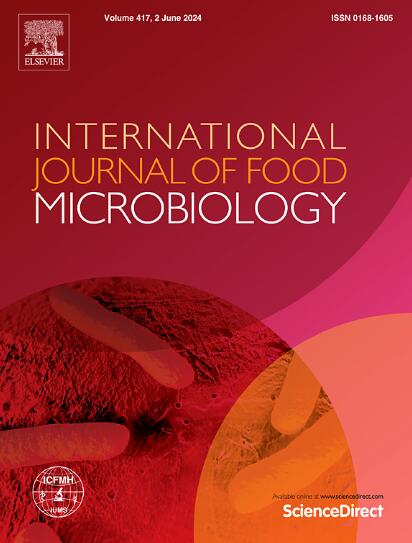Effects of carbon dioxide on germination of Clostridium botulinum spores
IF 5.2
1区 农林科学
Q1 FOOD SCIENCE & TECHNOLOGY
International journal of food microbiology
Pub Date : 2024-10-30
DOI:10.1016/j.ijfoodmicro.2024.110958
引用次数: 0
Abstract
Clostridium botulinum is a Gram -positive, strict anaerobic, rod -shaped, spore -forming, SOD -positive and catalase -negative bacterium. Its antioxidant defenses are not suited to chronic oxidative stress. H₂O₂ and reactive oxygen species have deleterious effects on C. botulinum. Spore germination is one of the key steps in its development. However, the mechanisms that trigger this germination have yet to be described. To manage C. botulinum growth, it is essential to understand the mechanisms that underlie the germination process. In this article, a series of complementary cascade reactions with water -dissolved CO₂ as an initiating germinant, and bicarbonate is suggested. It seems clear that ATP production is achieved through the use of various anaplerotic reactions with dissolved CO₂ as the carbon source. In addition to the production of oxaloacetate, an intermediate metabolite pyruvate would also be synthesized. Pyruvate would initiate the second phase of germination by producing hydrogen, which is a powerful reducing agent, via two enzymes (pyruvate -ferredoxin oxidoreductase and ferredoxin hydrogenase). These conditions would activate proteolytic enzymes and would reduce and would break the disulfide bridges of the proteins that make up the spore coats, thereby opening them. Thus, the phosphoenolpyruvate -pyruvate -acetyl -CoA pathway, in the presence of CO₂, would play a major role in the germination of spores of C. botulinum.
二氧化碳对肉毒梭菌孢子萌发的影响
肉毒梭状芽孢杆菌是一种革兰氏阳性、严格厌氧、杆状、形成孢子、SOD 阳性和过氧化氢酶阴性的细菌。它的抗氧化防御系统不适用于慢性氧化应激。H₂O₂和活性氧会对肉毒杆菌产生有害影响。孢子萌发是肉毒杆菌发育的关键步骤之一。然而,引发孢子萌发的机制尚未得到描述。要控制肉毒杆菌的生长,就必须了解萌芽过程的基本机制。本文提出了一系列以水-溶解的 CO₂为起始萌发剂和碳酸氢盐的互补级联反应。显然,以溶解的 CO₂ 为碳源的各种无碳酸盐反应可以产生 ATP。除了产生草酰乙酸外,还会合成中间代谢产物丙酮酸。丙酮酸通过两种酶(丙酮酸-铁氧还蛋白氧化还原酶和铁氧还蛋白氢化酶)产生氢气,氢气是一种强大的还原剂,从而启动萌芽的第二阶段。这些条件会激活蛋白水解酶,使构成孢子衣的蛋白质的二硫桥发生还原和断裂,从而打开孢子衣。因此,在有 CO₂ 的情况下,磷酸烯醇丙酮酸-丙酮酸-乙酰-CoA 途径将在肉毒杆菌孢子的萌发过程中发挥重要作用。
本文章由计算机程序翻译,如有差异,请以英文原文为准。
求助全文
约1分钟内获得全文
求助全文
来源期刊
CiteScore
10.40
自引率
5.60%
发文量
322
审稿时长
65 days
期刊介绍:
The International Journal of Food Microbiology publishes papers dealing with all aspects of food microbiology. Articles must present information that is novel, has high impact and interest, and is of high scientific quality. They should provide scientific or technological advancement in the specific field of interest of the journal and enhance its strong international reputation. Preliminary or confirmatory results as well as contributions not strictly related to food microbiology will not be considered for publication.

 求助内容:
求助内容: 应助结果提醒方式:
应助结果提醒方式:


